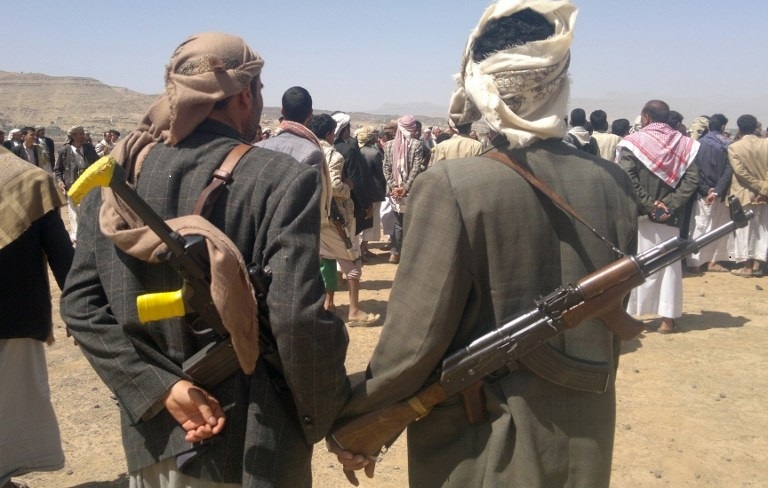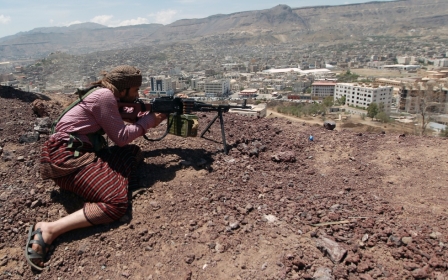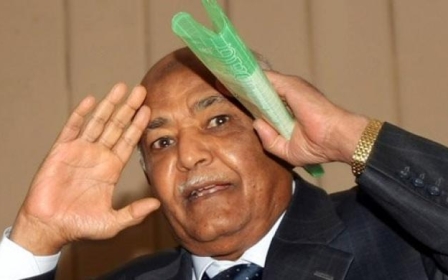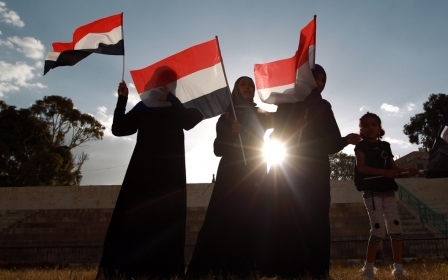Clashes in Yemen's Jawf flare up despite fall of Sana’a

AL-MUKALLA, Yemen - The current bloody situation in the province of Jawf is analogous with a previous scenario that occurred in the neighbouring Amran where the Houthi Shiite rebels fought their rival tribal and religious forces before crushing them on 7 July.
A northern tribal province abutting Saudi Arabia, the province of Jawf has been the scene of deadly clashes between the Houthis and the Islamist Islah party backed by some allied army troops.
Violence erupted in some areas in the province days before the Houthis declared victory in Amran on 7 July. Most of the province is still untouched by the Houthis.
Unlike the war in Amran, Islah fighters managed to hold back the Houthi advance in two main districts.
The confrontations have not been affected by the quick capture of the capital on Sunday by Houthi rebels.
Mohammad Salem Bin Oboud, the governor of Jawf, told Middle East Eye that clashes erupted when the Houthis established a checkpoint on 4 July in the main road between the province and the capital.
"The Houthis confiscated army provisions and harassed soldiers which provoked us into raising the issue with the president who ordered the removal of the checkpoint willingly or otherwise,"
The governor said that the deadly confrontations have claimed the lives of 151 and injured 430 people. The Houthis usually refuse to disclose the number of their deaths. The fighting has also displaced hundreds of families and left many others stranded in conflict zones in Ghail and Sagia districts.
The UN news centre reported on 18 September that the ongoing deadly fighting in the province has displaced about 1,500 families since late July, with 1,200 families receiving aid from the UN. The governor said that as many as 8,000 people have left homes and taken shelter in other areas.
Locals say that there are not many supplies of food or shelter arriving to displaced people.
“ In the early days of the fighting when the number of displaced families was 500, each family received blankets, YR15000 ($70) and a bag of flour.” Mobarak al-Obadi, the head of Jawf Media and Human Right Centre, told MEE. Fighting has also disrupted education in Ghail district where schools are either knocked down or closed and their students accompanied fleeing relatives. In the adjusting quiet areas like the capital al-Hazem, students did not attend classes as their schools are full of displaced people.
Al-Badi said: “ Schools are chock-a-block with families. I counted seventy families taking shelter in one school in al-Hazem. The tents are filling in the school’s yards.”
Airstrikes
The humanitarian situation in the province worsened on 14 September when government warplanes missed their targets twice and killed many civilians in a small village called al-Roudh, al-Ghalag district.
Al Raqeeb Human Rights Foundation, a local NGO based in the Yemeni capital, said in a statement that the two airstrikes killed a civilian and wounded eight others including a 13-year-old girl and a boy who is in critical condition in a local hospital. An old woman was also injured in the strike. Minister of Defence, Mohammad Nasser Ahmed, quickly sent a senior army officer to the area to investigate the incident and ordered the reparation to victims. But the popular notion in the country is that these official inquiry committees are “temporary pain relievers” to absorb people’s anger.
Former government's role
When the Arab Spring inspired protests swept the Yemeni cities in 2011, the province of Jawf was among the provinces that revolted against Ali Abdulla Saleh’s government. Unlike many cities that remained under Saleh’s control for some time, anti-government protesters in the province quickly stormed government offices and army government bases and police and declared freeing the province from Saleh’s grip. The Islamist Islah party was the driving force behind these protests and their allied tribesmen formed Popular Committees to govern the province. The current governor and other senior officials were among those protesters. The Houthis deem these committees are militias controlled by Islah party.
Now, locals who are confronting the Houthi offensive say that they are paying the price for challenging Saleh’s government in 2011. Officials say that some influential tribesmen who are still loyal to the former president are allegedly collaborating with the Houthis to crush Islah supporters.
"The former regime is seeking to take revenge on the Islahis who challenged his regime in 2011. They signed an agreement with the Houthis to allow them to enter areas to purge the Islahis,” Abdul Ghani Sha’alan, deputy chief of the province said in a short interview with the MEE.
Iran in Jawf
Since the emergence of the Houthi insurgency in 2004, former and current presidents have accused the Houthis of being a "stooge" for their coreligionists in Tehran. The Jawf governor repeated their accusations adding that the Iranians are using the Houthis to threaten neighbouring Saudi Arabia.
"The Houthis want to take control of the border line with Saudi Arabia to establish a pro-Iran state," Bin Oboud said. The Houthis have responded by saying that their "alarmist" opponents exaggerate their threat in order to extort cash from wealthy Saudis.
Usama Sari, a pro-Houthi activist and journalist, told MEE that his group is not fighting to apply the Iranian model of an Islamic state. “We only seek peace, stability and peaceful coexistence."
Oil factor
Last year, strong rumours about the discovery of huge oil and gas discoveries in Jawf province were widely disseminated in the local press. The government boosted these rumours when it announced in September 2013 that the province does have “promising” oil and gas reserves. Officials link the announcement of the discoveries to the mounting violence in the province. Bin Oboud said: "We do not rule out the possibility that the Houthis are trying to control the new oil wells in Jawf.” Despite the quick fall of the Yemeni capital and other provinces in northern Yemen, local officials in Jawf insist that the Houthis will not take over their province. "Tribes are more coherent,” Sha’alan said.
Last week, the Hamadan tribe, a large tribal confederation stretched in many areas in northern Yemen, brokered a deal between the Houthis and the Public Committee. Under the deal, both sides have pulled out their armed men from the district of Ghail district, but the Houthis have kept some of their men there. Their remaining checkpoint at the entrance of the district stops people who want to enter or exit from Ghail. They double-check identities and seize mobiles. The warring factions have stopped fighting on the Ghail front but have engaged in battles in al-Sagia.
But sceptics think that the deal will face the fate of many previous ceasefires in Jawf and Amran that crumbled shortly after signing them.
Next battlefield
The neighbouring restive province of Mareb is poised to be the next battleground as there are reports about sporadic clashes between the Houthis and their rival Islamist and tribal forces. The UN said on 18 September that clashes in Mareb had disputed aid for hundreds of displaced families who fled war in the neighbouring province of Jawf.
New MEE newsletter: Jerusalem Dispatch
Sign up to get the latest insights and analysis on Israel-Palestine, alongside Turkey Unpacked and other MEE newsletters
Middle East Eye delivers independent and unrivalled coverage and analysis of the Middle East, North Africa and beyond. To learn more about republishing this content and the associated fees, please fill out this form. More about MEE can be found here.




